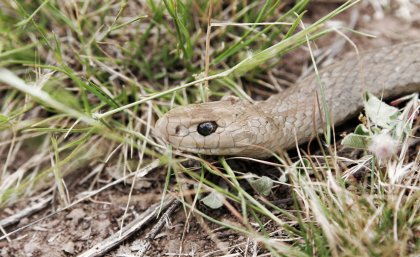
Summer is a season of sun, sand, snakes, and UQ’s veterinarians would like to add common sense and survival to the mix.
University of Queensland School of Veterinary Science staff say common sense can help avoid injuries to people, pets and snakes.
UQ VETS Small Animal Hospital’s Associate Professor Bob Doneley said anyone who crossed paths with a snake should not approach it or try to catch it.
“Rather, they should wait for it to pass or quietly walk away,” he said.
“If it’s on your property ensure your pets are locked up until the snake moves away; if it’s in your house contact a qualified snake catcher or snake removalist who will quickly and safely relocate the snake without injury to you or the animal,” he said.
Associate Professor Doneley said it was a fallacy snakes went out of their way to “attack” people.
“Snakes do not ordinarily prey on humans and will avoid using unnecessary energy and wasting their venom,” he said.
“They can sense the size of a prey from your footsteps and will try to avoid you, lie still or move away, and will only bite as a last resort in self-defence.
“The people most likely to be bitten are gung-ho Australian males aged 18 to 35, with a high blood alcohol content, who decide to pick up snakes or hit them with a shovel or a hoe or a pick-axe.”
He said snakes were surprisingly resilient and UQ VETS had treated some snakes that had survived horrific injuries to their spines from these implements.
Associate Professor Doneley, who heads the Avian and Exotic Pet Service, said reported snake sightings increased in spring and summer as snakes became more active as the weather heats up. Their metabolism quickens, and they feel the need to eat and the urge to reproduce.
“An important tip is unless you’re experienced with snakes, it’s difficult to identify them by colour, size and shape.
What you might think is a non-venomous python could be a venomous eastern brown,” he said.
“We’ve seen eastern brown snakes at the UQ VETS Small Animal Hospital in many colours – brown, orange and grey, and even with stripes – and the juveniles can be just as dangerous.
“Even non-venomous snakes such as carpet pythons and spotted pythons pack a painful bite equivalent to being hit by a hammer.”
While most snakes will try to avoid you and your pets, a dog or cat may get bitten if it gets too close.
If they are bitten by a snake they might collapse, vomit and get up and appear normal for 10 to 60 minutes before collapsing again.
Delayed treatment could be fatal, so anyone who suspects their pet has been bitten by a snake should apply a pressure bandage if possible, ring their local vet and take it in for treatment immediately.
The UQ VETS Small Animal Hospital general practice at Gatton is opens 8am-6pm Monday to Friday until 23 December, and re-opens on 3 January. It is open 24/7 with a fully staffed emergency service, telephone 07 54 601 788.
Contact: Associate Professor Bob Doneley, r.doneley@uq.edu.au, 07 5460 1788.
.jpg)









